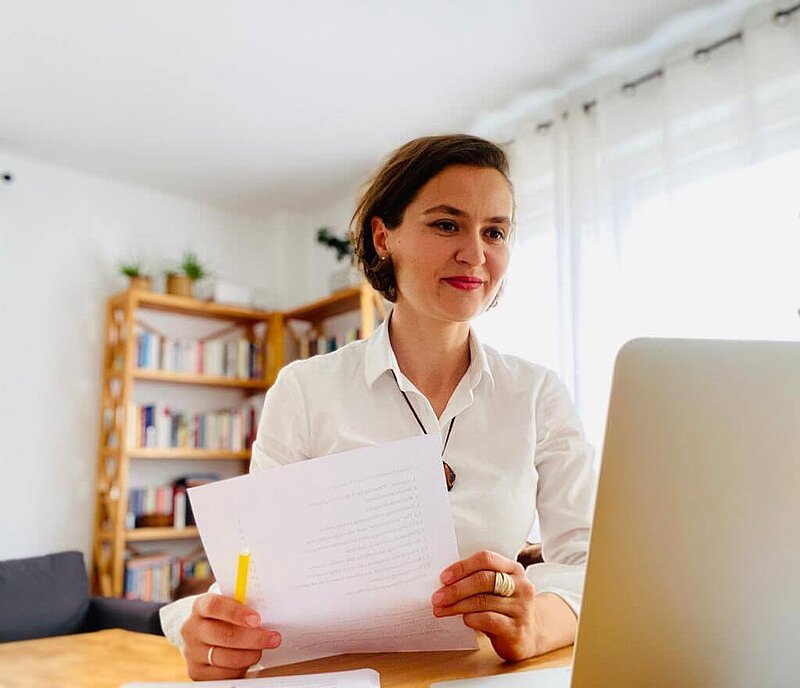
Executive Education project for the Eurasia Foundation and USAID aims to cultivate vibrant, responsive civil society.
“In a good advocacy process, you absolutely must do field work, with a good chunk of time spent with people you are studying or topics you are researching. Because that way, you not only learn the outcomes of a bad policy you're trying to change, but you also get all the material you need to make your best argument.”
That was advice Besa Shahini, Hertie School graduate and former Albanian Minister of Education, had for a group of think tank executives from Central Asia during a series of advocacy workshops held online in April and May 2021. The “Think Tank Leadership Workshop Series“ was organised by the Hertie School for a Eurasia Foundation project funded by the USAID’s Civil Society Support Program in Central Asia.
The aim was to offer leaders of research and advocacy organisations in Kazakhstan, Tajikistan, Turkmenistan and Uzbekistan tools to improve the quality of policy research and evidence‐based dialogue, and to better inform and influence public policy‐making. Long-term, the project aims to cultivate a vibrant and responsive civil society throughout the region and help build a new generation of forward-looking civil society leaders.
The 16 sessions focused on practical skills like state-of-the-art methodological approaches for policy analysis and impact evaluation, composing compelling analytical reports, developing advocacy strategies and ways to more effectively lead organisations.
According to one of the workshop participants “the course will be useful for both beginners and experienced leaders, because an overview of innovations and best practices allows you to replenish or update a collection of knowledge and skills, as well as provides answers to questions and dilemmas that arise almost daily in the work of NGOs.“
Stories from the field
In the third of three segments, Besa Shahini offered personal insights from her experiences working for think tanks – some of which she founded – in Berlin, Istanbul, Tbilisi, Pristina and Sarajevo. Shahini received her Master of Public Policy from the Hertie School in 2009 and went on to serve as Albania’s Minister of Education, Sport and Youth from 2017 until the end of 2020. She is the recipient of a Hertie School Alumni Achievement Award.
Drawing on her time at the European Stability Initiative, a Berlin-based NGO, Shahini described her work on a campaign to improve education in Kosovo: “We set out to find out: What is wrong with education in Kosovo?” She explained their research methods and the huge variety of people they interviewed – from teachers and school librarians to EU and United Nations officials, and how they documented and presented their findings. After six months of research, they decided that to make an impact, they needed to start with the basics: “That was textbooks – because kids usually didn’t have any other books at home. So the one provided free of charge by the government had to be good.”
With a concise, highly targeted nine-page paper, the group was successful in influencing the debate about textbooks in Kosovo, Shahini said. “The paper identifies the problem, sets the scene where it takes place, describes the actors that are important to keep in mind. And it had one strong message, one strong call for action. We had done our research, which gave us a lot of credibility.”
Writing, Big Data and action plans
The workshops also hit upon writing for impact. Hertie School Director of Executive Education Bernhard Knoll-Tudor gave a two-day workshop on writing policy briefs. The training introduced participants to structuring analytical reports and briefs, with practical guidance for synthesizing major research findings and presenting a set of clear, practical, persuasive recommendations and conclusions.
Another segment of the series was devoted to methodology for policy analysis and evidence-based policymaking, taught by Anar Ahmadov, Associate Professor of Political Economy at Leiden University. He introduced some of the latest research methods, including the use of Big Data and best practices such as stakeholder analysis, drawing on quantitative and qualitative approaches.
Besa Shahini’s workshop was taught together with Rolf Alter, economist and Senior Fellow at the Hertie School, who led the group through a series of exercises, with participants focusing on a particular policy problem and how to map their actions through the policymaking process.
Frank Garrison, Project Coordinator in the Hertie School’s Exec Ed team, said he hopes the workshops will be a pilot for similar, future projects.
The Hertie School is not responsible for any content linked or referred to from these pages.
Views expressed by the author/interviewee may not necessarily reflect the views and values of the Hertie School.
